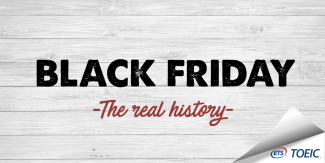
It makes sense that the term “Black Friday” might refer to the single day of the year when retail companies finally go “into the black” (i.e. make a profit). The day after Thanksgiving is, of course, when crowds of turkey-stuffed shoppers descend on stores all over the country to take advantage of the season’s biggest holiday bargains. But the real story behind Black Friday is a bit more complicated—and darker—than that.
The first recorded use of the term “Black Friday” was applied not to holiday shopping but to financial crisis: specifically, the crash of the U.S. gold market on September 24, 1869. Two notoriously ruthless Wall Street financiers, Jay Gould and Jim Fisk, worked together to buy up as much as they could of the nation’s gold, hoping to drive the price sky-high and sell it for astonishing profits. On that Friday in September, the conspiracy finally unraveled, sending the stock market into free-fall and bankrupting everyone from Wall Street barons to farmers.
The most commonly repeated story behind the post-Thanksgiving shopping-related Black Friday tradition links it to retailers. As the story goes, after an entire year of operating at a loss (“in the red”) stores would supposedly earn a profit (“went into the black”) on the day after Thanksgiving, because holiday shoppers blew so much money on discounted merchandise. Though it’s true that retail companies used to record losses in red and profits in black when doing their accounting, this version of Black Friday’s origin is the officially sanctioned—but inaccurate—story behind the tradition.
In recent years, another myth has surfaced that gives a particularly ugly twist to the tradition, claiming that back in the 1800s Southern plantation owners could buy slaves at a discount on the day after Thanksgiving. Though this version of Black Friday’s roots has understandably led some to call for a boycott of the retail holiday, it has no basis in fact.
The true story behind Black Friday, however, is not as sunny as retailers might have you believe. Back in the 1950s, police in the city of Philadelphia used the term to describe the chaos that ensued on the day after Thanksgiving, when hordes of suburban shoppers and tourists flooded into the city in advance of the big Army-Navy football game held on that Saturday every year. Not only would Philly cops not be able to take the day off, but they would have to work extra-long shifts dealing with the additional crowds and traffic. Shoplifters would also take advantage of the bedlam in stores to make off with merchandise, adding to the law enforcement headache.
By 1961, “Black Friday” had caught on in Philadelphia, to the extent that the city’s merchants tried unsuccessfully to change it to “Big Friday” in order to remove the negative connotations. The term didn’t spread to the rest of the country until much later, however, and as recently as 1985 it wasn’t in common use nationwide. Sometime in the late 1980s, however, retailers found a way to reinvent Black Friday and turn it into something that reflected positively, rather than negatively, on them and their customers. The result was the “red to black” concept of the holiday mentioned earlier, and the notion that the day after Thanksgiving marked the occasion when America’s stores finally turned a profit. (In fact, stores traditionally see bigger sales on the Saturday before Christmas.)
The Black Friday story stuck, and pretty soon the term’s darker roots in Philadelphia were largely forgotten. Since then, the one-day sales bonanza has morphed into a four-day event, and spawned other “retail holidays” such as Small Business Saturday/Sunday and Cyber Monday. Stores started opening earlier and earlier on that Friday, and now the most dedicated shoppers can head out right after their Thanksgiving meal. According to a pre-holiday survey this year by the National Retail Federation, an estimated 135.8 million Americans definitely plan to shop over the Thanksgiving weekend (58.7 percent of those surveyed), though even more (183.8 million, or 79.6 percent) said they would or might take advantage of the online deals offered on Cyber Monday.
GLOSSARY
Accounting (n): the business or work of organizing, maintaining, and checking financial records.
Astonishing (adj): causing great surprise or amazement
Bankrupt (v): to make a person lose all his money so he cannot pay his debts
Bargain (n): a purchase were one pay less than the usual cost
Bedlam (n): a place or situation of wild noise and confusion; Chaotic situation.
Ensue (v): to follow as a consequence; result
Make a profit (set phrase): to obtain monetary benefits from a business or transaction
Retail (n): the sale of goods to individual consumers.
Sanctioned (adj): to be recognized officially or by law.
Spawn (v): to produce; to generate.
Stuffed (adj): filled with something, especially with any kind of poultry and other food
-
Añadir nuevo comentario



